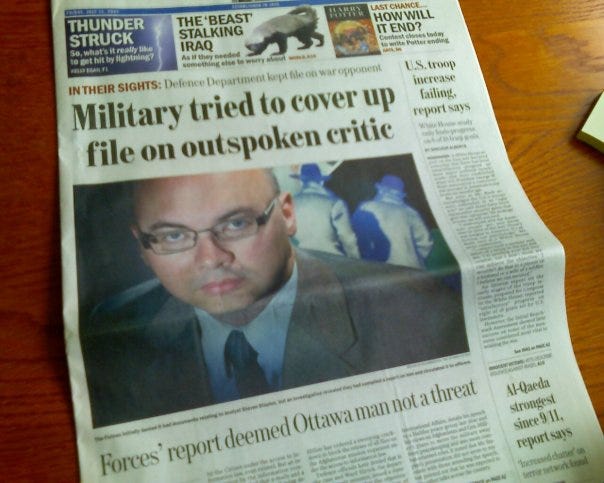Did you hear the news this week?
Prime Minister Justin Trudeau committed to $8 billion in additional military spending over the next five years and $73 billion over the next two decades.
Meanwhile, researchers revealed the next day that the government has failed to spend more than $14 billion it committed to fight climate change since taking power in 2015.
Why is there such funding disparity between the military and the environment? Public opinion research provides part of the picture.
Poll on the public’s funding priorities
The Angus Reid Institute polled people about their priorities for the upcoming federal budget, which will be announced on Tuesday.
By far, the area of spending most people said the government is spending too little is health care (67%). Not far behind health care is the military (48%).
Canada once championed preserving the environment, but according to this poll, more people say the government is spending too much on the environment (32%) than say it is spending too little (29%).
Source: http://www.anguesreid.org
How can this be happening?
These priorities are very surprising, considering Canadians’ self-image as a peacekeeping nation and an environmental champion. Public opinion seems to have shifted in the opposite direction.
As you may know, I have worked for peace for much of my career.
During the early 2000s, journalists often invited me to counter the arguments of the retired generals and pro-military academics who were frequenting the front pages of our major media outlets.
You can imagine my evidence-based challenges drew scorn in some quarters, especially during the Stephen Harper years, when the pro-war Conservatives were in power.
Cover up
Journalist David Pugliese found that the military tried to conceal that it had been monitoring my activities.
Here is David Pugliese’s front page story in the Ottawa Citizen back in 2007, reprinted by Ceasefire.ca.
This crucial issue is why I want you to join me in our online studio audience using Zoom to tape our first podcast, Military Manipulation, on Tuesday, April 16 at 8 PM ET, 5 PM PT.
We will ask the question: Does the Canadian Armed Forces try to influence public opinion through the media?
All paid subscribers can claim a free ticket to be in the Zoom room with me and our guest, award-winning Postmedia defence reporter David Pugliese.
Paid subscriptions are just $5.50 each month or $55 per year. Sign up and claim your free ticket.
If you’re a paid subscriber, watch for a complimentary Zoom link in your email inbox on Tuesday, April 16 to join us.
If you enjoyed this article, please like, share and comment.
A message from David Pugliese, Postmedia
Steve Staples repeatedly raised warnings and concerns about the war in Afghanistan. The Canadian Forces responded by putting him under surveillance. An advisory was circulated at military headquarters among 50 officers, including two brigadier generals, of the need to counter his views and arguments.
That gives you a pretty good idea that Staples isn’t scared to tell like it is, no matter what government organization or high-ranking officials it will anger.
David Pugliese, journalist
Did you miss last week’s newsletter?
Thanks so much for everything you do for peace!
Steve



















Military manipulation